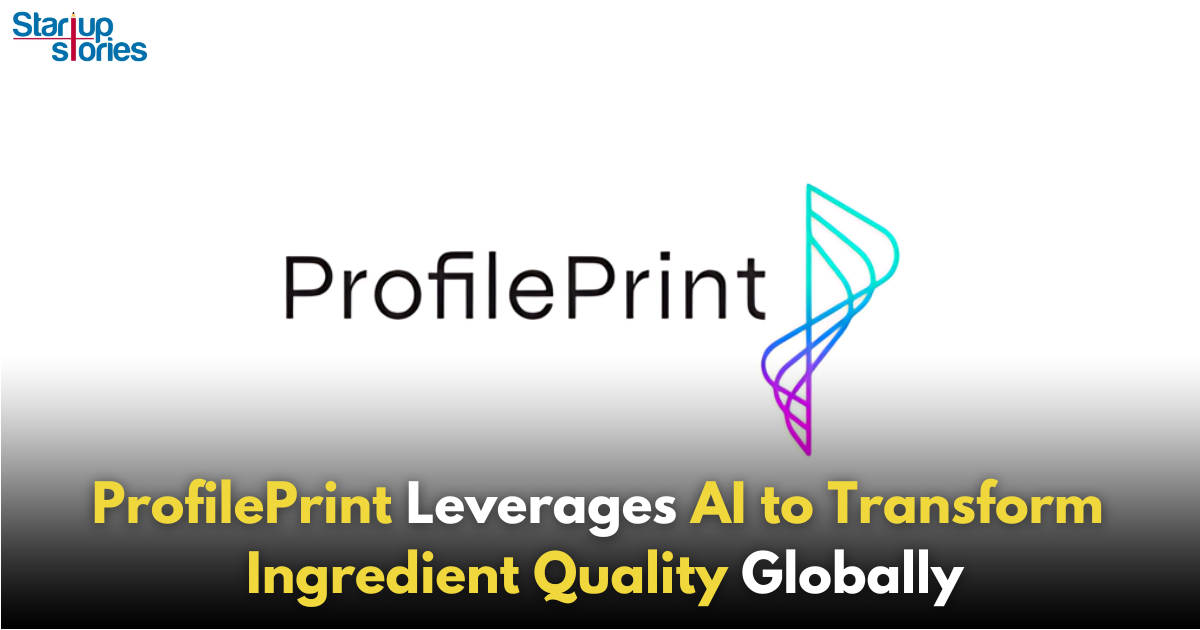Artificial Intelligence
Singapore Startup ProfilePrint Uses AI to Revolutionize Ingredient Quality Control for a Global Market!

As the world’s population continues to grow, so does the demand for food production. However, balancing this need with sustainability and quality control remains a significant challenge. A Singapore-based startup, ProfilePrint, is tackling this issue with its innovative technology aimed at revolutionizing the way agribusinesses assess ingredient quality.
Digital Fingerprints: A New Approach to Ingredient Quality
ProfilePrint has developed a patented digital fingerprint technology that enables rapid and accurate ingredient analysis, saving time and reducing costs for agribusinesses. By using machine learning and molecular-level analysis, ProfilePrint’s technology captures and digitalizes the unique “fingerprint” of food ingredients, allowing producers and traders to make informed decisions without the need for physical sampling.
CEO Insights
Alan Lai, CEO and founder of ProfilePrint, explains that the current ingredient trade system relies heavily on sending physical samples back and forth across the supply chain, which increases both cost and carbon footprint. “ProfilePrint digitalizes food ingredients, so buyers and sellers no longer need to ship samples physically, significantly reducing logistics costs and environmental impact,” Lai says.
How ProfilePrint’s AI-Powered Technology Works
ProfilePrint’s platform allows companies to create custom AI models to assess raw ingredients for specific quality criteria, such as appearance, taste, and molecular composition. Using its platform, companies can quickly determine if an ingredient meets their requirements or if it contains any defects that might impact the product’s final quality.
Demonstration of Capabilities
In a demonstration, Lai showed how ProfilePrint’s technology can detect even minor defects in coffee beans—such as beans that have been improperly fermented or damaged by insects—by analyzing them at a molecular level and instantly providing a quality assessment. “The molecules are captured and converted into a digital fingerprint that contains detailed information about the ingredient,” he explains. Within seconds, the AI system processes the data to provide a quality rating or pricing suggestion.
Expanding Applications and Global Reach
Beyond coffee and tea, ProfilePrint envisions broad applications for its technology in food quality control and security. By offering insights into flavor profiles, pricing, and quality trade-offs, the platform empowers clients to make data-driven purchasing decisions.
Growth Journey
Founded in 2017, ProfilePrint has grown from Lai’s experiences observing farmers in Uganda and China, where limited resources often led to low selling prices despite high product quality. Today, the startup operates globally with deployments in over 60 locations across six continents. Its digital nature allows clients worldwide to access the service remotely, providing a scalable solution for agribusinesses of all sizes.
Backed by Visionary Investors
ProfilePrint’s potential has attracted investors like Yukihiro Maru, founder of Leave a Nest Capital in Japan. Maru sees ProfilePrint as an example of how AI can transform the agribusiness industry, especially in emerging markets. “ProfilePrint can adapt its technology beyond coffee and tea, moving into the food security space,” he said at the Singapore Week of Innovation and Technology (SWITCH) conference.
Industry Context
ProfilePrint is part of a growing sector of AI-driven startups focused on food quality and ingredient analysis. U.S.-based companies like Aromyx and Brightseed also use AI to optimize flavor and health benefits in food and supplements. However, with its unique digital fingerprinting approach, ProfilePrint is poised to make significant inroads into the global market by providing fast, cost-effective solutions to improve ingredient quality control and efficiency.
Commitment to Sustainability
Beyond enhancing operational efficiency, ProfilePrint’s technology promotes sustainability by providing traceability features that allow end buyers to access digital signatures and geographical records of their ingredients. This transparency helps ensure fair compensation for farmers based on quality while fostering trust in the supply chain.
Conclusion
As demand for quality food production continues to rise, ProfilePrint’s innovative technology offers a promising path forward by combining AI with practical solutions for global agribusinesses to meet quality standards sustainably and efficiently. The startup’s approach not only addresses immediate challenges in ingredient assessment but also sets the stage for future advancements in food safety and quality assurance across diverse markets.
With ongoing developments in AI technology, ProfilePrint is well-positioned to lead the charge in transforming how food ingredients are evaluated globally while contributing positively to both producers’ livelihoods and consumer safety.
Artificial Intelligence
Adopt AI Secures $6 Million to Power No-Code AI Agents for Business Automation

Adopt AI, a San Jose and Bengaluru-based agentic AI startup, has raised $6 million in seed funding led by Elevation Capital, with participation from Foster Ventures, Powerhouse Ventures, Darkmode Ventures, and angel investors. The funding will be used to expand the company’s engineering and product teams and to scale enterprise deployments of its automation platform.
Founded by Deepak Anchala, Rahul Bhattacharya, and Anirudh Badam, Adopt AI offers a platform that lets businesses automate workflows and execute complex actions using natural language commands, without needing to rebuild existing systems. Its core products include a no-code Agent Builder, which allows companies to quickly create and deploy AI-driven conversational interfaces, and Agentic Experience, which replaces traditional user interfaces with text-based commands.
The startup’s technology is aimed at SaaS and B2C companies in sectors like banking and healthcare, helping them rapidly integrate intelligent agent capabilities into their applications. Adopt AI’s team includes engineers from Microsoft and Google, with Chief AI Officer Anirudh Badam bringing over a decade of AI experience from Microsoft.
The company has also launched an Early Access Program to let businesses pilot its automation solution and collaborate on new use cases.
Artificial Intelligence
Social Media Platforms Push for AI Labeling to Counter Deepfake Risks

Social media platforms are intensifying efforts to combat the misuse of deepfake technology by advocating for mandatory AI labeling and clearer definitions of synthetic content. Deepfakes, created using advanced artificial intelligence, pose significant threats by enabling the spread of misinformation, particularly in areas like elections, politics, and personal privacy.
Meta’s New Approach
Meta has announced expanded policies to label AI-generated content across Facebook and Instagram. Starting May 2025, “Made with AI” labels will be applied to synthetic media, with additional warnings for high-risk content that could deceive the public. Meta also requires political advertisers to disclose the use of AI in ads related to elections or social issues, aiming to address concerns ahead of key elections in India, the U.S., and Europe.
Industry-Wide Efforts
Other platforms like TikTok and Google have introduced similar rules, requiring deepfake content to be labeled clearly. TikTok has banned deepfakes involving private figures and minors, while the EU has urged platforms to label AI-generated media under its Digital Services Act guidelines.
Challenges Ahead
Despite these measures, detecting all AI-generated content remains difficult due to technological limitations. Experts warn that labeling alone may not fully prevent misinformation campaigns, especially as generative AI tools become more accessible.
Election Implications
With major elections scheduled in 2025, experts fear deepfakes could exacerbate misinformation campaigns, influencing voter perceptions. Social media platforms are under pressure to refine their policies and technologies to ensure transparency while safeguarding free speech.
Artificial Intelligence
Transforming India’s AI Landscape: OpenAI and Meta’s Collaborative Talks with Reliance Industries

OpenAI and Meta Platforms are reportedly in discussions with India’s Reliance Industries to explore potential partnerships aimed at enhancing their artificial intelligence (AI) offerings in the country. This development underscores India’s growing significance in the global AI landscape.
Key Aspects of the Discussions
- Partnership with Reliance Jio: One of the main focuses is a potential collaboration between Reliance Jio and OpenAI to facilitate the distribution of ChatGPT in India. This could enable wider access to advanced AI tools for businesses and consumers, leveraging Reliance’s extensive telecommunications network.
- Subscription Price Reduction: OpenAI is considering reducing the subscription cost for ChatGPT from $20 to a more affordable price, potentially just a few dollars. While it is unclear if this has been discussed with Reliance, such a move could significantly broaden access to AI services for various user demographics, including enterprises and students.
- Infrastructure Development: Reliance has expressed interest in hosting OpenAI’s models locally, ensuring that customer data remains within India. This aligns with data sovereignty regulations and addresses growing concerns about data privacy. A planned three-gigawatt data center in Jamnagar, Gujarat, is expected to serve as a major hub for these AI operations.
Market Implications
These potential partnerships reflect a broader trend among international tech firms aiming to democratize access to AI technologies in India. If successful, they could reshape India’s AI ecosystem and accelerate adoption across various sectors. As negotiations continue, stakeholders are closely monitoring how these alliances may impact India’s technological landscape and its position as a leader in AI innovation.













binance us register
March 28, 2025 at 11:26 am
Thanks for sharing. I read many of your blog posts, cool, your blog is very good.
Registrasi Binance
August 27, 2025 at 2:47 pm
Your article helped me a lot, is there any more related content? Thanks! https://www.binance.info/kz/register-person?ref=RQUR4BEO
create a binance account
October 3, 2025 at 10:27 am
Thank you for your sharing. I am worried that I lack creative ideas. It is your article that makes me full of hope. Thank you. But, I have a question, can you help me? https://www.binance.info/join?ref=P9L9FQKY
谷歌站群
November 6, 2025 at 9:30 pm
专业构建与管理谷歌站群网络,助力品牌实现全域流量的强势增长。谷歌站群
Kuwin
November 7, 2025 at 4:41 am
kuwin sở hữu kho game đa dạng từ slot đến trò chơi bài đổi thưởng, mang đến cho bạn những giây phút giải trí tuyệt vời.
MM88
November 7, 2025 at 8:19 am
Khám phá thế giới giải trí trực tuyến đỉnh cao tại MM88, nơi mang đến những trải nghiệm cá cược thể thao và casino sống động.
谷歌蜘蛛池
November 9, 2025 at 8:26 am
利用强大的谷歌蜘蛛池技术,大幅提升网站收录效率与页面抓取频率。谷歌蜘蛛池
iwin
November 9, 2025 at 9:40 pm
iwin – nền tảng game bài đổi thưởng uy tín, nơi bạn có thể thử vận may và tận hưởng nhiều tựa game hấp
MM88
November 16, 2025 at 12:23 am
Với giao diện mượt mà và ưu đãi hấp dẫn, MM88 là lựa chọn lý tưởng cho các tín đồ giải trí trực tuyến.
GO88
November 21, 2025 at 12:43 pm
Tham gia cộng đồng game thủ tại Go88 để trải nghiệm các trò chơi bài, poker phổ biến nhất hiện nay.
J88
November 30, 2025 at 7:07 am
Đến với J88, bạn sẽ được trải nghiệm dịch vụ cá cược chuyên nghiệp cùng hàng ngàn sự kiện khuyến mãi độc quyền.
Frumzi Casino Lizenz
December 20, 2025 at 8:37 pm
Bei diesem Programm erhalten VIPs in der Online Spielhalle einen persönlichen Betreuer, erhöhte Limits
und Zugang zu VIP-Räumen im Live Casino. Diese Aktionen bieten dir die Möglichkeit, regelmäßig
von zusätzlichen Belohnungen zu profitieren und dein Casinoerlebnis
aufzupeppen. Das Willkommenspaket ist besonders attraktiv und bietet neuen Spielern einen hervorragenden Start mit
verbesserten Gewinnchancen.
Die Website bietet Jackpot-Slots, an denen die Spieler um
hohe Preise spielen können. Ob Gelegenheits- oder Vielspieler – Mr Pacho liefert eine reibungslose
und fesselnde Art zu spielen. Insgesamt scheint MrPacho
Casino eine solide Wahl für Online-Glücksspieler zu sein, die eine einzigartige Kombination aus Unterhaltung und Belohnungen bietet.
Neben den traditionellen Tischspielen bietet das MrPacho Casino auch
eine Reihe von Spezialspielen wie Hi-Lo und Punto Banco an.
Die Auswahl an Tischspielen im MrPacho Casino ist ziemlich umfangreich
und bietet den Spielern eine Vielzahl von Optionen. Die Mr Pacho casino bonuses decken jedes Spielerbedürfnis ab.
Die Umsatzbedingungen bleiben mit 35-fachem Durchspielen im fairen Bereich.
Der Mr Pacho casino bonus überzeugt durch Vielfalt und Großzügigkeit.
References:
https://online-spielhallen.de/pistolo-casino-handy-app-ihr-mobiles-spielvergnugen/
Bars slot machine odds
December 27, 2025 at 12:21 pm
One (1) wedding gift will be delivered to your room during
your stay. Continue the most important day of your life with an unforgettable night at Crown Towers Perth.
Valet parking for one (1) vehicle only for duration of stay and
is subject to availability.
Opening hours are subject to change at management discretion, including Public
Holidays and special events. Soak up a day lounging by the
pools. Kick back in the funky outdoor beer garden at The Merrywell pub, or
sip on cocktails overlooking the Perth city skyline at the breathtaking new TWR bar.
References:
https://blackcoin.co/4-reasons-to-avoid-an-online-poker-casino/
low deposit casino sign up PayID
December 27, 2025 at 8:22 pm
Leon Casino’s live casino section delivers an authentic gaming experience, bringing
the excitement of real-time play directly to your screen. With their instant results and interactive features,
crash games add an exciting dimension to the overall gaming experience at Leon Casino.
The games are simple to understand, making them appealing to both new and experienced players.
The process is secure, ensuring only authorised users can enter their accounts and
enjoy the full suite of gaming and betting options.
The live casino is accessible 24/7 and features professional
dealers, high-definition streaming, and interactive chat functions, allowing for a truly immersive atmosphere.
Whether you prefer the fast pace of blackjack, the suspense of roulette, or the strategic depth of poker, Leon Casino’s table game selection delivers
quality and choice for every type of player.
The games are powered by reputable software providers, ensuring
smooth gameplay and fair outcomes. Players can also enjoy video poker, craps, and other popular
card games, providing a well-rounded experience beyond just pokies.
Travel the globe and experience the world’s hottest sex without ever leaving your
couch when you explore the free porn videos uploaded by our large community of international users.
YouPorn has an unbeatable selection of free porn that you will
be hard pressed to find on any other tube site.
Yes, Leon Casino is a legitimate online
casino, licensed by the Kahnawake Gaming Commission and Curacao,
and uses strong security measures to protect players.
While there are some areas for improvement, such as high wagering requirements
on certain bonuses and a few minor terms and conditions, the overall experience is positive.
Its licensing by reputable authorities and the use of advanced security measures
provide players with a safe and fair environment.
Overall, Leon Casino’s customer support is
professional, efficient, and tailored to provide timely solutions
for Australian players at any hour of the day or night.
References:
https://blackcoin.co/online-gambling-in-sydney-a-comprehensive-guide/
http://seoul911.com
December 29, 2025 at 8:31 am
paypal casino usa
References:
http://seoul911.com
pandahouse.lolipop.jp
December 29, 2025 at 8:40 am
online casino real money paypal
References:
https://pandahouse.lolipop.jp:443/g5/bbs/board.php?bo_table=aaa&wr_id=3101754
https://jobteck.com/companies/best-online-casinos-australia-top-aussie-gambling-sites-2025
December 30, 2025 at 1:39 pm
casino online uk paypal
References:
https://jobteck.com/companies/best-online-casinos-australia-top-aussie-gambling-sites-2025/
https://vhembedirect.co.za
December 30, 2025 at 1:51 pm
online casino for us players paypal
References:
https://vhembedirect.co.za/employer/online-casino-australia-top-real-money-casino-list/
EnriqueKix
February 7, 2026 at 8:39 am
mortgage loans for police officers https://otvetnow.ru schools in sec